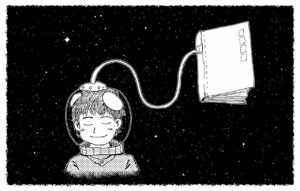
Hi everyone! Welcome back to our English space where you can find interesting websites and ideas to improve your learning English learning. Today we are going to tackle a complex topic: phrasal verbs.
A phrasal verb is a phrase that consists of a verb with a preposition or an adverb, or both. In many cases the meaning of the phrasal verb cannot be deduced from its separate elements. In addition, many phrasal verbs are polysemous i.e., they have more than one meaning. There are also difficulties with the grammar of phrasal verbs, particularly with the position of the particles, in that some phrasal verbs are ‘separable’ (the particle can be moved), while some are ‘inseparable.’ Quite apart from all this, there are literally thousands of them
Some phrasal verbs make the change from specialized language or different assortments of English to the ordinary, regularly by means of TV, where the majority of these models come from. Cookery shows on TV have made us acquainted for certain specialized terms from the culinary expert’s reality, including plate up.
Their number is developing constantly. The Cambridge dictionary is consistently keeping watch for them, and they’re added to the word reference similarly as other new words.
When a speaker needs to find a verb to describe their debates at a specific point, a creative usage of English produces a slew of new verbs and particles. One frequent method is to manipulate one of the phrasal verb’s elements, such as the verb or the particle. For example, we can manipulate the verb and instead use a noun like in recipe out (being tired of doing recipes) or partied out (being tired of going to parties) or even an adjective. The verb vague something up (meaning ‘to make something seem less clear or detailed’) or to big something up (‘to recommend something in an enthusiastic way’). And if we manipulate the particle, we need to know the basics. The particle OFF is often used to express the idea of removing something (as in phrasal verbs like cut off and cross off). OUT particle is used creatively to express the idea of having done something so much that you don’t want to do it anymore (i.e., burn out, worn out). And UP is often used creatively in two ways: Improving, making something seem more sophisticated, attractive, interesting, or exciting. (like jazz up and dress up), and preparing for something by gathering things or people together (like stock up.)
You can get started into phrasal verbs on You Tube channel Amigos ingleses and their video Los 100 phrasal verbs más usados .
If you want to keep updated, I strongly recommend the following webs:
• www.quickanddirtytips.com – the website of “Grammar Girl”, linguist Mignon Fogarty
• www.macmillandictionary.com – see Word of the Week articles and the Real Vocabulary or Real Grammar videos
• www.urbandictionary.com – a cornucopia of street-speak (some very slang and taboo items) Hope you enjoy it!



